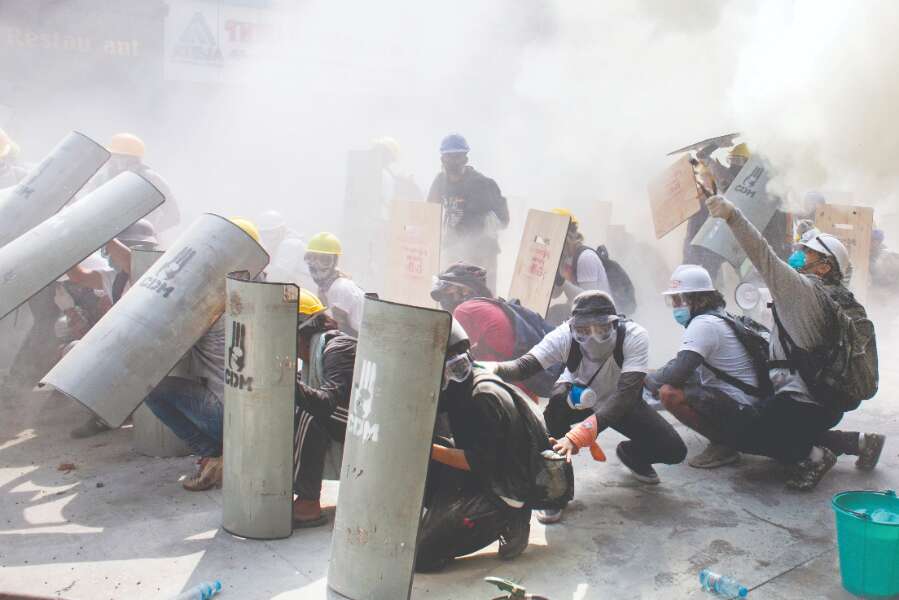No solution in sight
Myanmar protests are far from subsiding unless the junta backs down which seems improbable

After the February 1 military coup in Myanmar, which sought to delegitimize the landslide victory of Aung San Suu Kyi's National League for Democracy (NLD) in the November elections, the situation in the country is rapidly deteriorating with growing popular resistance against the military regime.
Protests that began with the banging of pots and pans have intensified significantly into a major uprising with hundreds of thousands of people taking to the streets across the country. The military seems to have been taken by surprise by the people's reaction.
Caught off-guard by the extent and intensity of the protests, the junta has responded with lethal force, by using not only tear gas and water cannon but also firing live bullets into dense crowds of protestors. It indicates that the military will stop at nothing to suppress the protests.
The protesters, mostly peaceful, are demanding a return to democracy. Strikes across several sectors, even by civil servants, have crippled the economy. There have been reports that at least 20 people, including some security personnel, have crossed to Mizoram from Myanmar and sought refuge.
Nearly 150 pro-democracy agitators have been killed and hundreds injured so far in the military action. There is no sign of the situation abating.
The media is also facing a crackdown and at least 10 journalists have been detained without charges.
According to reports, martial law has been imposed in parts of Yangon and Mandalay, which have witnessed the most intense resistance to the coup, provoking the junta to crack down further on the protests. With reports of night-time raids and custodial deaths, it is feared that martial law will cause many potential human rights violations.
Reports say that martial law allows military commanders to take over the administration, including the courts. The control over courts will allow the junta to hand down death sentences, long prison terms and other punishments for offences such as treason and dissent.
Suu Kyi remains in detention and has been accused, along with other leaders of the NLD, of corruption by the military regime. The overwhelming majority garnered by Suu Kyi's party in the November election reflected its popularity even though it did not have many notable achievements under its belt over the previous five years in power.
The world's military and economic superpowers have responded to the military action by imposing sanctions. The US, Britain and Canada have individually announced sanctions such as travel bans and asset freezes on Myanmar's top military general. South Korea has announced the suspension of defence exchanges with Myanmar. Russia and China, which have close ties with the junta, may take the edge off the action.
India, which has close ties with both the Myanmar military and NLD, has just expressed its concern over the developments. India has extremely close relations with the Myanmar military that has assisted in securing the North East frontiers from insurgent groups.
Because of its substantial economic and strategic interest in Myanmar, China is trying to tread very carefully. There was a predictable bland statement from China, merely urging all parties to settle their differences peacefully.
China did back a watered-down UN Security Council statement, which, while failing to condemn the coup, did call for the release of Suu Kyi and a return to democratic rule. It shows that Beijing is not happy about the developments.
There is a widespread belief in Myanmar that China is backing the junta – so much so that Chinese officials were forced to break their customary silence and come out to deny rumours that it is helping the military build an internet firewall, or deploying special forces to help crush the protests.
The imposed sanctions are more intended only to hit those directly involved in the coup and the military's businesses, and unlikely to do anything that will change the mindset of the junta. The sanctions are ineffective to move the general much at this stage
These developments pose challenges for the 10-member Association of South-East Asian Nations (ASEAN) of which Myanmar is also a member. However, ASEAN faces particular challenges in addressing the crisis given the fact that it has customary consensus-based decision-making and non-interference in each other's domestic affairs.
ASEAN is not speaking in one voice on the crisis. Thailand, Vietnam, Cambodia and initially the Philippines (once the most liberal member state on human rights and democracy) have all refused to criticize the coup, describing it as an internal matter.
Singapore, the biggest foreign investor in Myanmar, has been strong in its reaction, expressing "grave concern" and describing the use of lethal force against protesters as "inexcusable".
Indonesia, ASEAN's largest country with a past history of taking the lead role in resolving issues like the Cambodian conflict in the 1980s, tried to find a solution to the crisis proposing the idea of holding the junta to its promise of a new election within a year as also releasing Suu Kyi and other NLD leaders and allowing them to contest the polls.
The idea enraged anti-military protestors who insist on honouring the November elections outcome and say that a fresh election only amounts to reward the military for overturning the overwhelming results of the election. This will only encourage the junta to carry out such activities in future.
The situation in Myanmar is precarious. Unless the military backs down and restores power to the civilian government and Suu Kyi, it does not appear that the protests would subside. For the military, it is a Catch-22 situation. If it backs down and restores power to Suu Kyi, it would mean its actions were illegal. Having said this, it is the military that can change the trajectory of the events in a deliberate and purposeful way.
The writer is a former Editor of PTI and served as the West Asia correspondent for the same. Views expressed are personal



